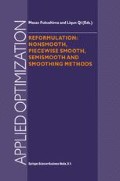Abstract
In a previous work the authors introduced a non—interior predictor-corrector path following algorithm for the monotone linear complementarity problem. The method uses Chen—Harker—Kanzow—Smale smoothing techniques to track the central path and employs a refined notion for the neighborhood of the central path to obtain the boundedness of the iterates under the assumption of monotonicity and the existence of a feasible interior point. With these assumptions, the method is shown to be both globally linearly convergent and locally quadratically convergent. In this paper it is shown that this basic approach is still valid without the monotonicity assumption and regardless of the choice of norm in the definition of the neighborhood of the central path. Furthermore, it is shown that the method can be modified so that only one system of linear equations needs to be solved at each iteration without sacrificing either the global or local convergence behavior of the method. The local behavior of the method is further illuminated by showing that the solution set always lies in the interior of the neighborhood of the central path relative to the affine constraint. In this regard, the method is fundamentally different from interior point strategies where the solution set necessarily lies on the boundary of the neighborhood of the central path relative to the affine constraint. Finally, we show that the algorithm is globally convergent under a relatively mild condition.
Access this chapter
Tax calculation will be finalised at checkout
Purchases are for personal use only
Preview
Unable to display preview. Download preview PDF.
References
J. Burke, Descent methods for composite nondifferentiable optimization problems, Mathematical Programming, 33 (1987), pp. 260–279.
J.Burke and S. Xu, The global linear convergence of a non-interior path-following algorithm for linear complementarity problem. To appear in Mathematics of Operations Research.
J. Burke and S. Xu,, A non-interior predictor-corrector path following algorithm for the monotone linear complementarity problem. Preprint, Department of Mathematics, University of Washington, Seattle, WA 98195, December, 1997.
B. Chen and X. Chen, A global and local super-linear continuation method for P o + R o and monotone NCP. To appear in SIAM Journal on Optimization.
J. Burke and S. Xu,, A global linear and local quadratic continuation method for vari- ational inequalities with box constraints. Preprint, Department of Management and Systems, Washington State University, Pullman, WA 991644736, March, 1997.
B. Chen and P. Harker, A non-interior-point continuation method for linear complementarity problems, SIAM J. Matrix Anal. Appl., 14 (1993), pp. 1168–1190.
B. Chen and N. Xiu, A global linear and local quadratic non-interior continuation method for nonlinear complementarity problems based on ChenMangasarian smoothing functions. To appear in SIAM Journal on Optimization.
C. Chen and O. L. Mangasarian, A class of smoothing functions for nonlinear and mixed complementarity problems, Comp. Optim. and Appl., 5 (1996), pp. 97–138.
X. Chen, L. QI, and D. Sun, Global and superlinear convergence of the smoothing Newton method and its application to general box constrained variational inequalities,Mathematics of Computation, 67 (1998), pp. 519540.
X. Chen and Y. Ye, On homotopy sm000thing methods for variational inequalities. To appear in SIAM J. Control Optim.
M. Fukushima, Z.-Q. Luo, and J.-S. Pang, A globally convergent sequential quadratic programming algorithm for mathematical programs with linear complementarity constraints, Computational Optimization and Applications, 10 (1998), 5–34.
K. Hotta and A. Yoshise, Global convergence of a class of noninterior-point algorithms using Chen-Harker-Kanzow functions for nonlinear complementarity problems. Discussion Paper Series, No. 708, University of Tsukuba, Tsukuba, Ibaraki 305, Japan, December, 1996.
H. Jiang, Smoothed Fischer-Burmeister equation methods for the complementarity problem. Report, Department of Mathematics, University of Melbourne, Parkville, Australia, June, 1997.
C. Kanzow, Some noninterior continuation methods for linear complementarity problems, SIAM J. Matrix Anal. Appl., 17 (1996), pp. 851–868.
C. Kanzow,, Private communications. Seattle, Washington, May, 1997.
M. Kojima, N. Meggido, T. Noma, and A. Yoshise, A unified approach to interior point algorithms for linear complementarity problems, Springer-Verlag, Berlin, 1991.
L. Qi and D. Sun, Improving the convergence of non-interior point algorithms for nonlinear complementarity problems. To appear in Mathematics of Computation.
L. QI, D. Sun, and G. Zhou, A new look at smoothing Newton methods for nonlinear complementarity problems and box constrained variational inequalities. Applied Mathematics Report, AMR 97/13, School of Mathematics University of New South Wales, Sydney 2052, Australia, June, 1997.
S. Smale, Algorithms for solving equations. Proceedings of the International Congress of Mathematicians, Berkeley, California, 1986.
P. Tseng, Analysis of a non-interior continuation method based on ChenMangasarian smoothing functions for complementarity problems, Reformulation–Nonsmooth, Piecewise Smooth, Semismooth and Smoothing Methods, M. Fukushima and L. Qi, eds., ( Kluwer Academic Publisher, Nowell, MA. USA, 1998 ), 381–404.
S. Xu, The global linear convergence of an infeasible non-interior path-folowing algorithm for complementarity problems with uniform P-functions. Technique Report, Department of Mathematics, University of Washington, Seattle, WA 98195, December, 1996.
S. Xu, The global linear convergence and complexity of a non-interior path- following algorithm for monotone LCP based on Chen-Harker-KanzowSmale smoothing function. Technique Report, Department of Mathematics, University of Washington, Seattle, WA 98195, February, 1997.
Author information
Authors and Affiliations
Editor information
Editors and Affiliations
Rights and permissions
Copyright information
© 1998 Springer Science+Business Media Dordrecht
About this chapter
Cite this chapter
Burke, J.V., Xu, S. (1998). A Non-Interior Predictor-Corrector Path-Following Method for LCP. In: Fukushima, M., Qi, L. (eds) Reformulation: Nonsmooth, Piecewise Smooth, Semismooth and Smoothing Methods. Applied Optimization, vol 22. Springer, Boston, MA. https://doi.org/10.1007/978-1-4757-6388-1_3
Download citation
DOI: https://doi.org/10.1007/978-1-4757-6388-1_3
Publisher Name: Springer, Boston, MA
Print ISBN: 978-1-4419-4805-2
Online ISBN: 978-1-4757-6388-1
eBook Packages: Springer Book Archive

